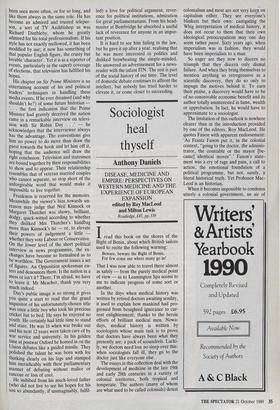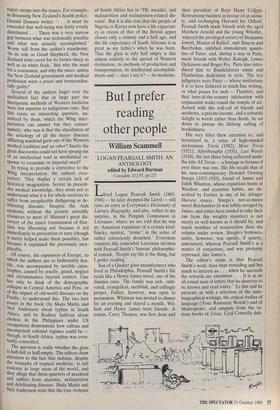Sociologist heal thyself
Anthony Daniels
DISEASE, MEDICINE AND EMPIRE: PERSPECTIVES ON WESTERN MEDICINE AND THE EXPERIENCE OF EUROPEAN EXPANSION edited by Roy MacLeod and Milton Lewis Routledge, E45, pp.339 Iread this book on the shores of the Bight of Benin, about which British sailors used to recite the following warning:
Beware, beware the Bight of Benin, For few come out where many go in!
That I was now able to travel there almost as safely — from the purely medical point of view — as to Leamington Spa seems to me to indicate progress of some sort or another.
In the days when medical history was written by retired doctors awaiting senility, it used to explain how mankind had pro- gressed from benighted ignorance to cur- rent enlightenment, thanks to the heroic efforts of brilliant medical men. Nowa- days, medical history is written by sociologists whose main task is to prove that doctors have always been what they presently are: a pack of scoundrels. Lucki- ly, we doctors need lose no sleep over this: when sociologists fall ill, they go to the doctor just like everyone else. The essays in this collection deal with the development of medicine in the late 19th and early 20th centuries in a variety of colonial territories, both tropical and temperate. The authors (many of whom are what used to be called colonials) detest colonialism and most are not very keen' on capitalism either. They see everyone's blinkers but their own: castigating the Whig interpretation of medical history, it does not occur to them that their own ideological preoccupations may one day seem rather passe. Sixty years ago, when imperialism was in fashion, they would have been imperialists to a man.
So eager are they now to discern no triumph that they discern only dismal failure. And when they bring themselves to mention anything so retrogressive as a scientific discovery, they do so only to impugn the motives behind it. To earn their praise, a discovery would have to be of no conceivable economic benefit and its author totally uninterested in fame, wealth or approbation. In fact, he would have to approximate to a sociologist.
The limitation of this outlook is nowhere clearer than in the introduction provided by one of the editors, Roy MacLeod. He quotes Fanon with apparent endorsement: `As Frantz Fanon put it, in the colonial context, "going to the doctor, the adminis- trator, the constable or the mayor [be- came] identical moves".' Fanon's state- ment was a cry of rage and pain, a call to action, the emotional foundation of a political programme, but not, surely, a literal historical truth. Yet Professor Mac- Leod is an historian.
When it becomes impossible to condemn utterly a colonial government, an air of regret creeps into the essays. For example, in discussing New Zealand's health policy, Donald Denoon writes: ‘. . . it must be conceded that well-being was fairly evenly distributed . . . There was a very narrow gap between what was technically possible and what was actually accomplished.' Worse still from the author's standpoint: In its role as Good Shepherd, the New Zealand state cared for its brown sheep as well as its white flock.' But why the need for a concession, and why the sneer, unless the New Zealand government and medical profession were a priori and transcenden- tally guilty?
Several of the authors linger over the undoubted fact that in large part the therapeutic methods of Western medicine were not superior to indigenous ones. But this raises an interesting question, un- noticed by them, which the Whig inter- pretation can answer but they cannot: namely, why was it that the elucidation of the aetiology of all the major diseases afflicting mankind grew out of the Western medical tradition and no other? Surely the great discoveries could not have sprung out of an intellectual void in mechanical re- sponse to economic or imperial need?
In trying to provide a corrective to the Whig interpretation, the authors over- correct. They display a certain lack of historical imagination. Secure in present- day medical knowledge, they seem not to understand what it is for whole societies to suffer from inexplicable disfiguring or de- bilitating diseases. Imagine the Aids epidemic without the present scientific resources to meet it! Manson's great dis- covery of the insect transmission of filar- iasis was liberating not because it led immediately to prevention or cure (though it surely helped make them possible), but because it explained the previously inex- plicable.
Of course, the expansion of Europe, to which the authors are so fashionably hos- tile, was accompanied by terrible catas- trophes, caused by cruelty, greed, neglect and circumstances beyond control. One has only to think of the demographic collapse in Central America and Peru, or of the impact of old-world diseases on the Pacific, to understand this. The two best essays in the book (by Shula Marks and Neil Andersson about typhus in South Africa, and by Rodney Sullivan about cholera in the Philippines under US occupation) demonstrate how callous and incompetent colonial regimes could be though, in South Africa, typhus was even- tually controlled.
The question is really whether the glass is half-full or half-empty. The editors draw attention to the fact that malaria, despite the triumphs of tropical medicine, is still endemic in large areas of the world, and they allege that three-quarters of mankind still suffers from anaemia, malnutrition and debilitating diseases. Shula Marks and Neil Andersson state that the true violence of South Africa lies in `TB, measles, and malnutrition and malnutrition-related dis- eases'. But it is also true that the people of Nigeria or Kenya now have a life expectan- cy in excess of that of the British upper classes only a century and a half ago, and the life expectancy of South Africans is as great as my father's when he was born. That the glass is only half empty is due almost entirely to the spread of Western civilisation, its methods of production and transportation, its intellectual accomplish- ments and — dare I say it? — its medicine.



























































 Previous page
Previous page